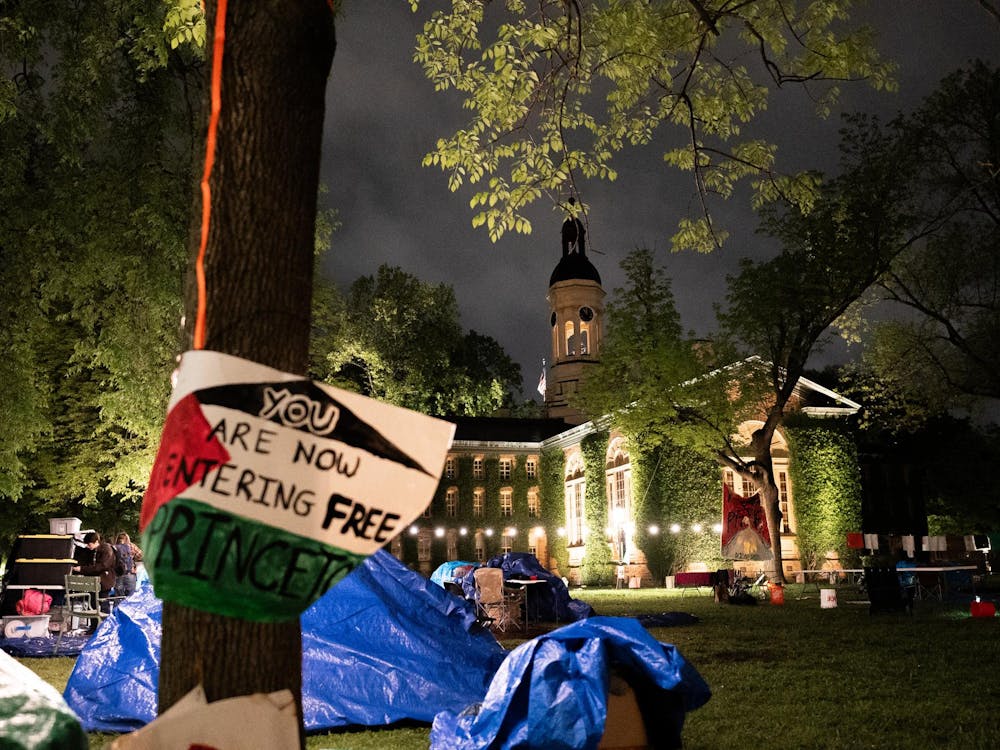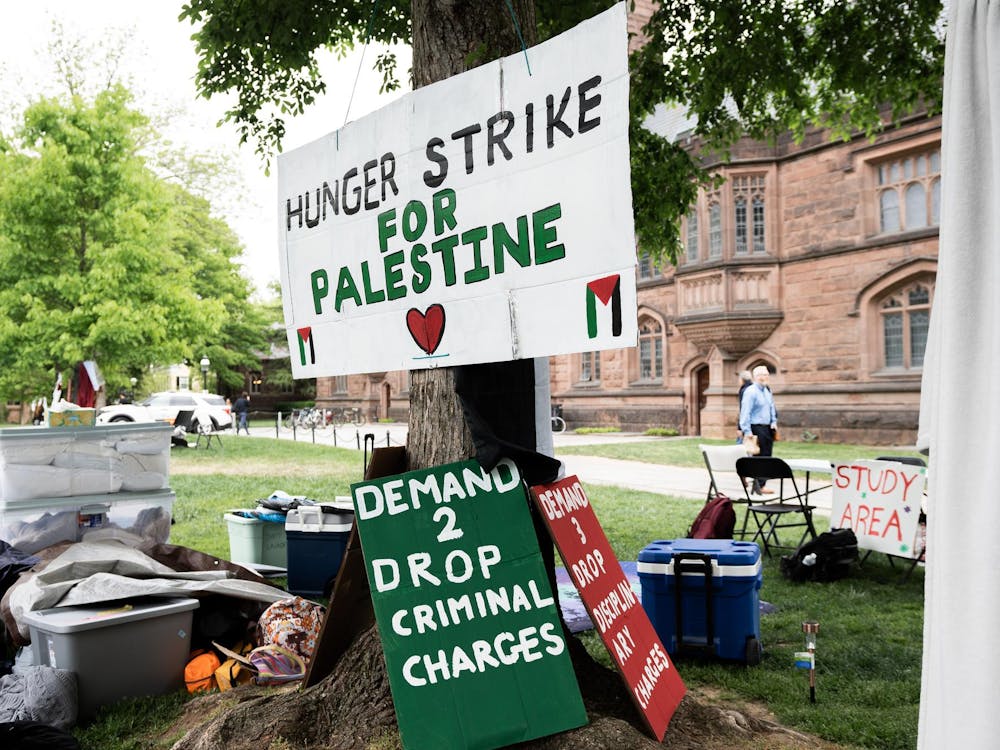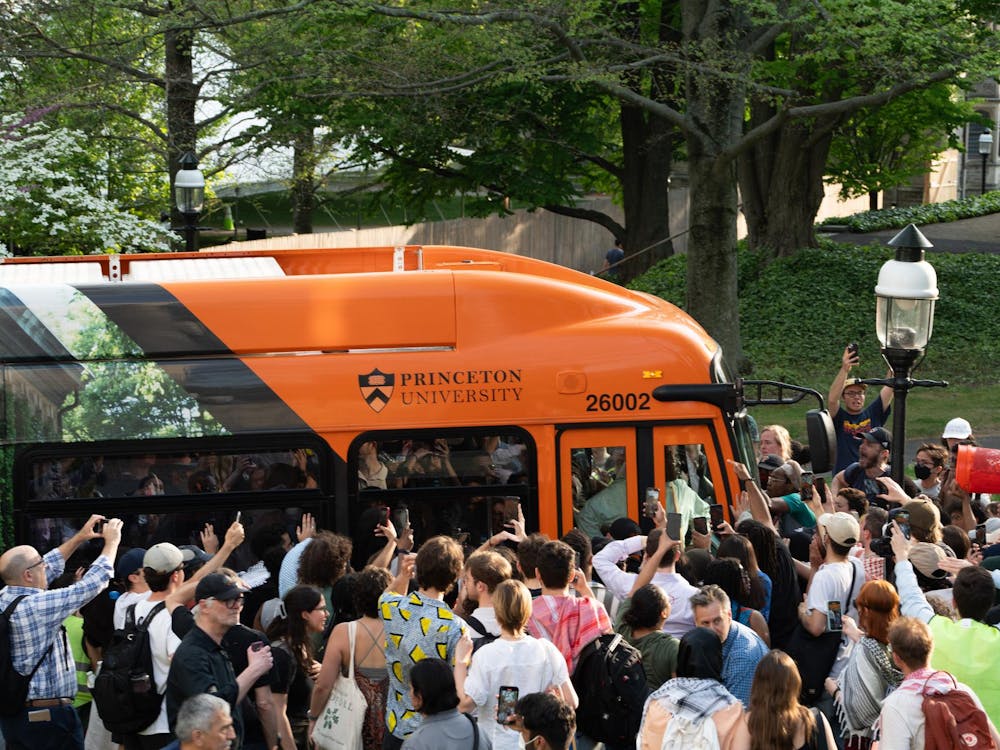The Undergraduate Student Government (USG) Senate held a special meeting on Monday, April 18 to discuss an appeal filed by four senate members that contested “the actions of Chief Elections Manager.” This comes as the results of Referendum No. 3, which calls on the University to halt usage of Caterpillar machinery, await certification. The senate voted on whether to accept the appeal in a meeting that wasn’t open to the public, but have yet to announce the results of their vote.
The appeal, filed by USG Treasurer Adam Hoffman ’23 and co-signed by 2025 senator Ned Dockery ’25, U-Councilor Carlisle Imperial ’25, and Sustainability Chair Audrey Zhang ’25, references text messages between Chief Elections Manager Brian Li ’24 and Tigers for Israel (TFI) President Jared Stone ’24 in which Li seems to imply that abstentions would be counted in the referendum’s overall vote tally.
Appendix D of the USG Constitution states that “the term ‘majority vote’ means more than half of the votes cast by individuals entitled to vote, excluding blanks or abstentions,” meaning that according to the constitution, abstentions should not be counted towards the total number of votes cast in this election. According to these rules, the referendum passes by two percent.
The four Senate members’ appeal argued that Li “is now committing to a representation of the ‘abstain’ option that is inconsistent with his representations communicated before and during the election period,” according to an email from USG President Mayu Takeuchi ’23.
Dockery and Stone declined to comment. Hoffman, Imperial, and Zhang did not respond to a request for comment by the time of publication. Hoffman is the former vice president of TFI.
Zhang is a contributing Prospect writer for The Daily Princetonian.
Some senate members, however, have pushed back on the appeal. According to a document obtained by the ‘Prince,’ Class of 2024 Senator Sean Bradley ’24 submitted a response letter, co-signed by Diversity, Equity and Inclusion (DEI) Chair Braiden Aaronson ’25, Social Committee Chair Madison Linton ’24, Campus and Community Affairs Chair and U-Councilor Isabella Shutt ’24, and 2025 Senator Walker Penfield ’25.
The writers said that while they “find these allegations [against the actions of the Chief Elections Manager] troubling,” they believe that “it is also important to weigh the impact that proposals such as nullifying or redoing the election would have.”
“We have a constitutional obligation to uphold the results of this election regardless of the miscommunication by our Chief Elections Manager,” they wrote. They suggested that, instead of nullifying the results of the election or holding a revote, the senate should take action to prevent similar issues from occurring again in the future.
In an email to the ‘Prince’ prior to the special meeting, Bradley clarified that these suggestions, which include splitting the role of Chief Elections Manager into two co-chiefs, “have nothing to do with me doubting [Li] or his work.” He wrote that he has “no doubts about [Li’s] ability to carry out [the] role” of Chief Elections Manager.
USG Vice President Hannah Kapoor ’23 and Linton declined to comment. Aaronson and Shutt could not be reached for comment by the time of publication.
In her opening remarks of the special USG meeting, Kapoor confirmed that Hoffman filed an appeal against the actions of the Chief Elections Manager within 48 hours of the vote, abiding by the guidelines set forth by the constitution.

USG Parliamentarian Kate Liu ’23 explained that the senate would need a two-thirds majority to formally accept the appeal, and a regular majority in vote for a remedy to the situation. These votes would take place behind closed doors.
USG Chief Elections Manager addresses ‘miscommunication,’ ‘needless attacks’ against him
During the meeting, Li addressed the incorrect statements in “unofficial” communications with a “community member unaffiliated with the official opposition.”
“I misspoke and I take full responsibility for this lack of clarity,” he said.
“It is not my place to quantify what the magnitude of this confusion may have been, as we did not know exactly how many abstentions were impacted by inconsistent messaging,” Li said. He cautioned against setting a precedent “in which representations by the elections managers will take precedence over binding guidance” in the USG Constitution. “Any remedies pursued must be in line with the constitution as it currently stands.”
Li also asserted his role as a neutral facilitator who had “nothing to lose or gain from the outcome of the proposition,” and he made mention of several “needless attacks” that have made him concerned for his personal safety.
Li’s name and image have been circulated by outside organizations opposed to the referendum.
In a message to the ‘Prince,’ Li noted that “I don’t believe it is actively circulating online, but individuals external to the University whom I have not been in contact with before have my phone number.”
He added that he appreciates that the University has been actively involved in protecting his privacy and personal safety.
“There have been many outlets and individuals outside of the University that have launched unfair attacks against USG,” he wrote in an email to the ‘Prince,’ “but here on campus, we all remain committed to fair elections that are representative of all voices.”
In an email to the ‘Prince,’ Penfield expressed “complete trust and support of the Chief Elections Manager, Brian Li, who has faithfully executed his duties as a neutral facilitator of our elections.” He added that “the hateful rhetoric that has targeted him, both personally and professionally, is detestable.”
Li is named in a petition circulating online that calls on the University to “certify the BDS referendum results.”
Palestinian political analyst Bassem Eid, who spoke at a panel on campus on Thursday, April 7 hosted by TFI and the American Whig-Cliosophic Society, tweeted a link to the petition on Monday, writing, “Join me in calling on the @PrincetonUSG to clarify that under the rules of the constitution, the BDS referendum question has failed.”
(The preliminary results made public Wednesday, April 13 indicate that the referendum passed but still have yet to be certified nearly a week later.)
Eid could not be reached for comment by the time of publication.
As the writer of the official appeal, Hoffman reiterated at the meeting that the appeal’s premise that Li’s incorrect statements regarding how abstentions would be counted shaped the opposition’s campaign strategy.
“In public events and in private conversations, as corroborated by dozens of students, the opposition argued for students to vote no or at least abstain,” Hoffman said.
“With such a close election, abstain votes were four times the margin between yes and no votes,” he said. “It is reasonable to believe that the results of the referendum would have been different if abstains were represented accurately during the election period.”
Hoffman argued that passing this referendum would not “be reflective of the students’ will,” and he said he supports a remedy such as “a statement clearly detailing what has occurred, as well as the numerical results of the referendum [election].”
In closing, Hoffman said that “my words should not be misconstrued as an attack on the Chief Elections Manager, a person I trust to be honest and of good will. While I believe our current circumstances have risen out of an honest mistake, that does not mean that the mistake is above remedy.”
Imperial, a co-signatory on the appeal, reaffirmed Hoffman’s assertion that Li’s incorrect information caused “a lack of fair campaigning.” Although conceding that passing the referendum would be “constitutionally consistent,” he said, “I implore the members of the senate to see that the reversal of the communicated position, which was understood to be accurate throughout the campaigning and voting period, results in a flawed election.”
Imperial seconded calls from Hoffman and Zhang for USG to write a “reconciliation paper,” a possible solution that Zhang noted was put forth by Takeuchi. Zhang explained that writing a reconciliation paper would mean “sending the results of this referendum as it is to the administrators to show what the student body has said.”
Referendum sponsors and opponents give statements on appeal at Senate meeting
The senate also heard statements from referendum sponsor and Princeton Committee on Palestine President Eric Periman ’23, as well as Myles McKnight ’23, who spoke on behalf of formal opposition leader Reid Zlotky ’23.
Periman said that the appeal “claims that this singular miscommunication was responsible for the entire faulty structure, formulation, and implementation of the opposition party’s campaign. This claim, much like this appeal, is ludicrous.” He referenced an Instagram account called @princeton_tigers_united that encouraged students to vote no on the referendum, not to abstain.
“There is absolutely no proof whatsoever offered by this appeal that voting students en masse, at large, believed that their abstentions, which by common vernacular means to refrain from the act of voting, would somehow be counted in the final tally for the referendum,” Periman said.
He urged senate members to vote no against the appeal, saying that “this appeal serves to challenge the democratic will of the undergraduate student body, and moreover, it invalidates and demeans the thoughtfulness with which students made their choice when voting in this election.”
“It also sets a horrifying precedent that any party can appeal and attempt to overturn a USG referendum election results when things do not go their way,” Periman added.
Penfield echoed Periman’s concerns, stating in an email to the ‘Prince,’ “[I] feel this appeal has weaponized an inconsequential miscommunication for senseless political gain — deepening the tensions already present on campus following the elections process.”
McKnight argued in response to Periman’s point that the communications cited in the appeal did not involve an official opposition leader, saying that “the opposition group consisted of a community of individuals” who based their campaign based around information provided by Li.
“We told hundreds upon hundreds of students that it would be better to abstain rather than not vote at all,” he claimed. “The difference between the yes or no votes was merely 95. Just 95. At the same time, over 400 people abstained. That error margin of the election should give anyone reason enough to think that it is at least possible, most definitely plausible, and perhaps even likely, that Brian's misstatement materially affected the outcome of the referendum.”
He emphasized that the opposition is “not arguing that under normal circumstances, abstentions should count” towards a referendum vote total, and noted that while he was initially “skeptical” of Takeuchi’s proposal to write a reconciliation paper, he has “come to think that it is a reasonable and fair compromise.”
McKnight’s statements at the meeting seemed to represent a change of heart: His initial email to Takeuchi on April 13 had stated that “the ‘abstain’ votes must be counted,” and that the “Referendum should thus fail” in order for the process to be remedied.
McKnight, Periman, and Zlotky declined to comment.
Takeuchi indicated in messages to the ‘Prince’ that the opportunity for the referendum and opposition sponsors to give statements was “granted as an executive courtesy in consideration of the vast community impact held by Referendum No. 03.”
After approximately 35 minutes of statements, the Senate moved into an Executive Session, which was closed to the public, to discuss and vote. Takeuchi wrote to the ‘Prince’ that “the USG Senate remains committed to fairness and transparency” and that the USG Constitution allows for Executive Sessions “to mitigate any external pressures that may prevent voting members from thoughtfully and honestly deliberating over the items before the Senate.”
According to Takeuchi, the decisions made during the Executive Session will be announced to the student body “by the end of the week.”
Annie Rupertus is a first-year from Philadelphia, Pa. and a News Staff Writer who covers USG for the ‘Prince.’ She is also a designer for the print issue.









